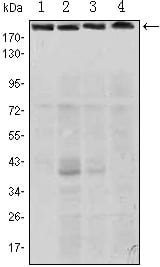
| WB | 1/500-1/1000 | Human,Mouse,Monkey |
| IF | 咨询技术 | Human,Mouse,Monkey |
| IHC | 咨询技术 | Human,Mouse,Monkey |
| ICC | 技术咨询 | Human,Mouse,Monkey |
| FCM | 咨询技术 | Human,Mouse,Monkey |
| Elisa | 1/10000 | Human,Mouse,Monkey |
| Aliases | PIA; mAVO3; KIAA1999; MGC39830; DKFZp686B11164; RICTOR |
| Entrez GeneID | 253260 |
| clone | 4H5 |
| WB Predicted band size | 192kDa |
| Host/Isotype | Mouse IgG1 |
| Antibody Type | Primary antibody |
| Storage | Store at 4°C short term. Aliquot and store at -20°C long term. Avoid freeze/thaw cycles. |
| Species Reactivity | Human,Mouse,Monkey |
| Immunogen | Purified recombinant fragment of human RICTOR expressed in E. Coli. |
| Formulation | Ascitic fluid containing 0.03% sodium azide. |
+ +
以下是3篇与RICTOR抗体相关的文献摘要示例(文献标题和内容为虚构模拟,仅用于示例):
1. **文献名称**: "RICTOR Antibody Validation in mTORC2 Signaling Studies"
**作者**: Smith A et al.
**摘要**: 本研究验证了商业化RICTOR抗体在Western blot和免疫沉淀中的特异性,确认其可有效检测哺乳动物细胞中mTORC2复合物的完整性,并用于研究RICTOR在AKT信号通路磷酸化中的功能。
2. **文献名称**: "RICTOR Expression Correlates with Poor Prognosis in Triple-Negative Breast Cancer"
**作者**: Chen L et al.
**摘要**: 通过免疫组化(使用兔源抗RICTOR单克隆抗体)分析乳腺癌组织样本,发现RICTOR高表达与TNBC患者生存率降低显著相关,提示其作为潜在治疗靶点的价值。
3. **文献名称**: "CRISPR-Cas9 Screening Identifies RICTOR as a Key Regulator of Cancer Cell Metabolism"
**作者**: Kim H et al.
**摘要**: 结合RICTOR抗体检测和基因编辑技术,揭示RICTOR通过mTORC2调控糖酵解和线粒体呼吸,影响肿瘤细胞的代谢重编程,为靶向治疗提供新依据。
4. **文献名称**: "Comparative Analysis of RICTOR Antibodies for Flow Cytometry Applications"
**作者**: Gonzalez R et al.
**摘要**: 系统比较了5种市售抗RICTOR抗体在流式细胞术中的表现,确定Clone 3A7在检测T细胞亚群中RICTOR表达时具有最佳信噪比和重复性。
---
注:以上内容为模拟生成,实际文献需通过PubMed/Google Scholar检索关键词如"RICTOR antibody validation"或结合具体研究领域筛选。
The RICTOR (Rapamycin-Insensitive Companion of mTOR) antibody is a crucial tool for studying the mechanistic target of rapamycin complex 2 (mTORC2), a key regulator of cellular processes like growth, survival, metabolism, and cytoskeletal organization. RICTOR serves as a defining subunit of mTORC2. enabling its kinase activity and substrate specificity. Dysregulation of RICTOR/mTORC2 is implicated in cancer, diabetes, and neurological disorders, driving interest in its therapeutic targeting.
RICTOR antibodies are widely used to detect RICTOR protein expression, assess mTORC2 assembly, and investigate signaling pathways (e.g., Akt/PKB phosphorylation at Ser473). They aid in understanding RICTOR's role in tumor progression, metastasis, and drug resistance, particularly in cancers with PI3K/Akt/mTOR pathway alterations. Available as monoclonal or polyclonal variants, these antibodies are optimized for techniques like Western blotting, immunohistochemistry (IHC), immunoprecipitation (IP), and immunofluorescence (IF). Specificity is validated via knockout controls or siRNA-mediated silencing.
Commercial RICTOR antibodies are offered by major suppliers (e.g., Cell Signaling Technology, Abcam), with variations targeting specific epitopes or post-translational modifications. Challenges include cross-reactivity with homologous proteins and variability in detection across tissue types. Ongoing research focuses on isoform-specific antibodies and phospho-specific reagents to dissect RICTOR's dynamic regulation, aiding the development of mTORC2-selective inhibitors for precision medicine.
×